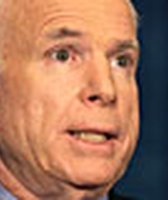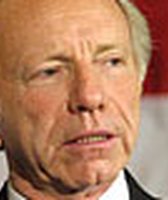Stand up for the facts!
Our only agenda is to publish the truth so you can be an informed participant in democracy.
We need your help.
I would like to contribute
Yes - and we borrow from the Saudis, too
Speaking to two of voters' biggest economic concerns, Sen. Hillary Clinton tried to link America's reliance on foreign oil with its need to borrow huge sums from foreign investors, saying, "We borrow money from the Chinese to buy oil from the Saudis. That is not a winning strategy for America." It's a great applause line with more than a kernel of truth, but the link between China and Saudi Arabia is not as direct as Clinton suggestions.
Let's try to break it down one step at a time.
The United States borrows money to keep our economy flush with cash by selling U.S. Treasury notes, bonds and other securities to foreign nations, corporations and private investors. These securities are regarded as among the safest investments in the world, and they bring a decent guaranteed rate of return, to boot. Japan is the biggest foreign purchaser of Treasuries, but China is a solid No. 2 -- it held $405.5 billion worth at the end of 2007. That accounts for about 17 percent of total foreign holdings of all Treasury securities. So it's true that China is a significant lender to the U.S.
The U.S. needs the Chinese and other foreign investors because our economy operates on borrowed money to meet all of its consumption needs. This is reflected in the oft-cited trade deficit, and in a less well-known but more accurate measurement called the current account deficit. The current account deficit is the trade deficit plus other things such as military aid. It provides the best picture of how much more the United States economy consumes in goods, services and investments than it's really capable of paying for.
The current account deficit hit a record $811.5 billion in 2006 -- the last year for which complete statistics are available -- and has more than doubled during President Bush's years in office. The United States has been running a deficit on this figure since 1991.
Sign up for PolitiFact texts
So, this practice of selling bonds, effectively borrowing money from the foreign countries that buy the bonds, is what keeps capital pumping into the U.S. economy. When China buys those treasuries that makes it possible for other investors, like banks, to loan money to companies that want to buy oil. Energy firms benefit because there is more cash available --at lower borrowing costs-- to purchase crude from producing nations.
Clinton's singling out of Saudi Arabia as the primary beneficiary of this transfer of wealth is a bit of a distortion because the Gulf nation is only the fourth-largest supplier to the United States, according to the Energy Information Administration. The United States draws far more from its own domestic sources, and Canada and Mexico. So, it would be a bit more accurate to say the U.S. borrows from China to buy oil from Canada, but what's the fun in saying that?
Featured Fact-check
Clinton was trying to make the additional point that the U.S. relies on oil from politically volatile regions. It's clearly a stretch to say the same capital China injects into the economy when it buys Treasury securities somehow winds up in the Saudis' pockets.
Clinton might have noted that Saudi Arabia also is a big investor in Treasury securities. That means some of the money we pay for crude oil circulates back to our economy when they buy Treasuries. It's all proof that what goes around, comes around.
Although Clinton is correct that China is a big investor in Treasuries, but her statement is misleading because it suggests that we're specifically using Chinese investments to pay for Saudi oil.
Our Sources
Department of Treasury, Major foreign holders of Treasury securities
Department of Commerce, International balance of payments
New York Times, A Map of the Oil World, Nov. 6, 2007
Browse the Truth-O-Meter
More by Adriel Bettelheim
Yes - and we borrow from the Saudis, too
Support independent fact-checking.
Become a member!
In a world of wild talk and fake news, help us stand up for the facts.















































